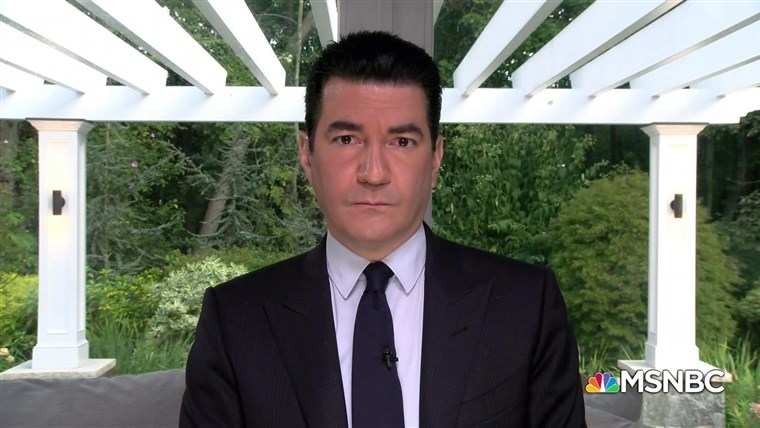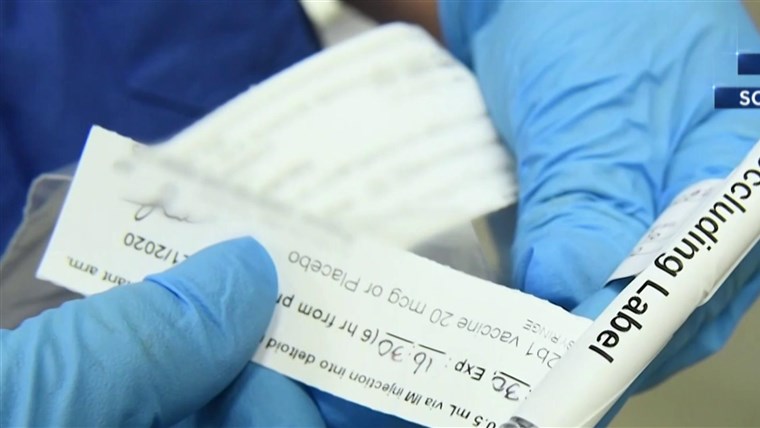WASHINGTON — President Donald Trump and Democrats are fighting over which side is more garishly politicizing the race to find a coronavirus vaccine.
Is it him pressuring drugmakers and federal agencies to begin mass coronavirus immunizations before November’s election, or Democrats sowing doubt about the safety of a vaccine produced on that timeline? The answer may affect the way some voters view Trump and Democratic nominee Joe Biden in the stretch run before Election Day.
Polls have consistently shown that most Americans don’t trust what Trump says about the coronavirus or how he’s handled the response to it. He may not need to reverse those sentiments to win, but it would sure help. And while Trump has come up short of swearing a blood oath to deliver the vaccine on a particular date, the allure of citing dates before the election is obvious.
“What I said is ‘by the end of the year,'” Trump said Monday at the White House. “But I think it could even be sooner than that. It could be during the month of October, actually. Could be before November.”
All at once, he acknowledged the potential political benefit of delivering a vaccine right before the election and denied that self-interest played any role in his thinking.
“With somebody else, maybe they would say it politically, but I’m saying it in terms of this is what we need,” Trump said. “If we get the vaccine early, that’s a great thing, whether it’s politics or not. Now, do benefits inure if you’re able to get something years ahead of schedule? I guess maybe they do.”
Outside Washington, Republicans say there’s big political value to the president if a vaccine is available before voters go to the polls.
“A vaccine before the election will absolutely move the needle,” Missouri House Speaker Elijah Haahr said in a text exchange with NBC News. “Whether or not people will take it, just the notion that there is a timeline to ending this pandemic would shift the national conversation.”
U.S. Surgeon General Jerome Adams has advised states to be ready to distribute a vaccine widely by Nov. 1, two days before the election. Trump’s critics say he is publicly leaning on scientists and regulators to work backward from that deadline, rather than following through on all the steps needed to ensure that any vaccine given to patients is effective and safe.
“The authorization or approval of any COVID-19 vaccine must be guided by science and data, not politics,” Sen. Maggie Hassan, D-N.H., said in a statement to NBC News Tuesday. “If the president continues to politicize the vaccine review process, it could put lives at risk — both because it could result in the premature release of a vaccine that could pose health risks to Americans, and because it could undermine public confidence in a vaccine, resulting in fewer Americans getting a vaccine even if it is safe and effective.”
Francis Collins, director of the National Institutes of Health, said at a Senate health panel hearing Wednesday that federal agencies are consolidating elements of the process that can be expedited without compromising safety. He said the freezing of one trial in England this week is a “concrete example” of how a safety issue can stall progress. And, he noted, the decision to load doses of potential vaccines for distribution before it’s known whether they work means hundreds of millions of dollars could be wasted.
He made a simple argument for moving quickly, even at the cost of wasted money: “People are dying.”
Adams acknowledged the challenging optics. “We have a once-in-a-century global pandemic superimposed over a presidential election,” Adams said Wednesday when asked about public hesitancy concerning a vaccine. He sought to assure senators that “there has been no politicization of the vaccine process whatsoever.”
Trump and officials on his campaign say that it’s Democratic presidential nominee Joe Biden and his running mate, Sen. Kamala Harris of California, who are dangerously discrediting a vaccine before it’s available. Harris has said that she wouldn’t trust a vaccine on Trump’s word and would listen to medical experts.
Democrats read polls and calendars, too. They know that Trump’s credibility numbers are soft, particularly when it comes to his handling of the coronavirus, and they know that a vaccine showing up two days before the election could reverse those numbers quickly — unless the public doesn’t trust that the vaccine has been properly vetted.
By Election Day — whether or not a vaccine has been delivered — it is likely that few voters will base their choice on what the candidates said in September.
But AstraZeneca provided a reminder Tuesday that science doesn’t always bow to politics. The drug company announced it was pausing a vaccine trial to review whether a patient illness arose from the vaccine or another factor.


 Jonathan Allen
Jonathan Allen
